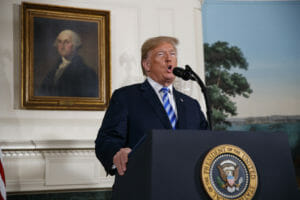Turn a Harsh Light Onto the Banks
It's reaching the point where desperate measures -- brutal honesty and complete transparency -- may be the only way to bring the economy out of its kamikaze dive. If so, this won't be pretty.It’s reaching the point where desperate measures — brutal honesty and complete transparency — may be the only way to bring the economy out of its kamikaze dive. If so, this won’t be pretty.
A certain amount of legerdemain is designed into the financial system and makes everyone richer. But those we trusted with the world’s money are being shown to have acted with such cupidity, irresponsibility and incompetence that a consensus seems to be forming around the cautionary words of George W. Bush, our greatest unintentional aphorist: “Fool me once, shame on — shame on you. Fool me — you can’t get fooled again.”
This week, the Obama administration is set to begin its “stress tests” of major U.S. banks to gauge their fundamental health. Officials clearly want to avoid nationalization of behemoths such as Citigroup or Bank of America — a drastic step that would probably be gussied up with a nice euphemism, such as “temporary receivership.” But the market, in driving the banks’ stock prices remorselessly downward, is betting that some kind of takeover is inevitable.
What credibility will officials have if they report that the banks still have a pulse? It’s unfair that President Obama’s team should be tainted by the sins of the past, but the recent record of federal regulators is one of abject failure. Bernard Madoff, investigators now say, scarfed up what he calculates as $50 billion of investors’ money and seems to have purchased no investments at all for at least the past 13 years. Allen Stanford took in something like $8 billion, and authorities can’t find the certificates of deposit he was supposed to have bought. If alleged scams of this magnitude were possible in broad daylight, under the government’s nose, what other outrages remain to be stumbled across?
This is not to suggest that the banks played a simple game of take the money and run. It’s to state what is now obvious — that they had a decade-long toga party, safeguarding our money with the diligence and sobriety of the fraternity brothers in “Animal House.”
What’s missing now from the whole system is trust, and trust can’t be re-established until we know how bad things really are. It’s understandable that Treasury Secretary Timothy Geithner and the rest of Obama’s economic team would be wary of full disclosure, but at this point I don’t think they have much choice. If they don’t give us a full, unbowdlerized report on what they find in their stress tests — computer runs of how the banks would hold up under various economic scenarios — suspicions will remain.
Nobody who has a choice is going to pour capital into banks that are thought perhaps to be “zombies,” with more “toxic” red ink than legitimate assets on their balance sheets. One way or another, the government is going to have to pony up — and there’s an argument for making a clean break with the past, through nationalization or whatever it’s ultimately called.
Some financial-sector stocks perked up Monday on reports that the Treasury Department was “open” to a proposal from Citigroup to effectively take more ownership of the bank but stop short of full nationalization. It’s understandable that investors would be heartened by the prospect that the money they already have in Citigroup wouldn’t be completely wiped out by a government takeover. But I think my reaction is closer to that of the average citizen: What standing does Citigroup have to propose anything?
Shouldn’t the executives of Citigroup, Bank of America and much of the rest of the nation’s financial establishment just say they’re sorry, sit down in the corner and shut up? Taxpayers have already spent hundreds of billions of dollars bailing out Wall Street, not to mention the trillions more we’ve put at risk in various kinds of backstop guarantees. Sincere apologies and expressions of gratitude would be nice to hear. “Have we got a deal for you” is pushing it.
Having to take over one or more of the big banks is the last thing the new administration needs on its already full plate, and I understand why Obama and his advisers will do anything they can to avoid taking that step. They can’t avoid revealing how bad things really are, though. They might as well go ahead and “let in daylight upon magic,” because the illusion is long gone.
Eugene Robinson’s e-mail address is eugenerobinson(at)washpost.com.
© 2009, Washington Post Writers Group
Your support matters…Independent journalism is under threat and overshadowed by heavily funded mainstream media.
You can help level the playing field. Become a member.
Your tax-deductible contribution keeps us digging beneath the headlines to give you thought-provoking, investigative reporting and analysis that unearths what's really happening- without compromise.
Give today to support our courageous, independent journalists.









You need to be a supporter to comment.
There are currently no responses to this article.
Be the first to respond.